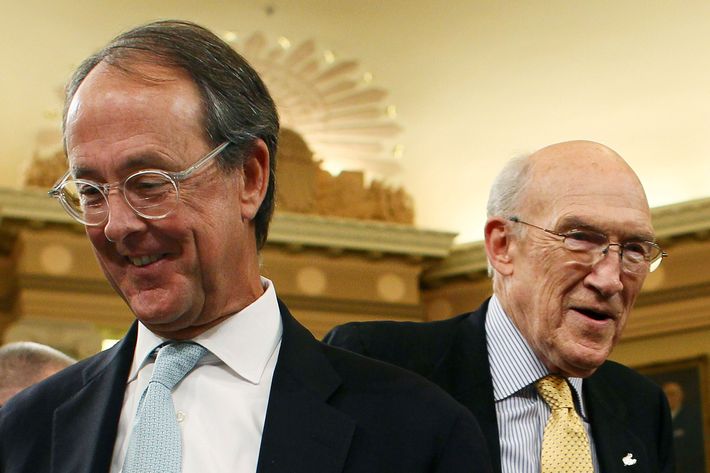
Since Republicans took control of the House of Representatives in 2011, economic policy has remained in a stalemate so deep it extends even to policies of putative agreement. The most current example is unemployment assistance. The main reason for the stalemate is the combination of strategic obstruction and ideological radicalism that dominates Congressional Republican thinking. But a second and nontrivial reason is that the deficit scolds have given the Republicans cover at every turn.
The deficit scolds are a loose amalgamation of business executives, activists, and pundits, often centered around Pete Peterson and his network of activist groups, allied around the goal of bringing both parties together to agree on a plan to reduce the long-term budget deficit. Unlike many liberals, I don’t find their policy goals terrible in and of themselves. The long-term deficit, while hard to predict — budget projections get less and less reliable the further out in time you take them — is probably too high. A bipartisan agreement along the lines suggested by the deficit scolds might be a positive thing.
The deficit scolds have consistently failed in their quest to achieve this bipartisan deficit-reducing dream. Despite this, they have dominated the economic-policy debate for most of the Obama era, and their influence has been an unremitting disaster for America.
The influence of the deficit scolds has worked in three major ways. The first has been to focus public, and especially elite, attention on the long-term deficit as the major crisis facing the world. Future economic historians will look back at the current day and wonder why American elites reacted to the crisis of mass unemployment — a humanitarian emergency of the first order, which has posed serious threats to the long-term capacity of its workforce for decades to come — by instead identifying as their highest priority a problem of no special urgency. Interest rates have sat at rock-bottom levels, yet productive labor, which could have been mobilized cheaply through short-term stimulus, has withered away out of misplaced fear of a phantasmal threat.
The second has been to prevent political accountability for the stalemate over the deficit. Since 2011, Obama has sought to forge a fiscal compromise along the lines advocated by the deficit scolds. Almost every channel he has tried — private negotiations with the House leadership, bipartisan outside committees, special bipartisan committees within Congress, regular budget negotiations, closed-door meetings with Senate Republicans, and compromise offers within his own budget — has failed. They have all failed for the same reason: Only Obama and many of his Democratic allies accept the basic framework favored by the deficit scolds, in which they trade cuts in retirement programs for higher tax revenue. Republicans will only accept cuts-only budget deals.

The deficit scolds have strategically obscured this political reality. No doubt they have done so in order to maintain their bipartisan credibility and position themselves to maintain influence within both parties. But this has brought them no closer to a deal, and has served only to reward the GOP’s opposition — if the public will give Obama equal or greater blame for the failure of a deal, what incentive do they have to compromise?
It is true that the deficit scold agenda is theoretically consistent with a response to the immediate economic crisis. Critics on the left have often called the deficit scolds “austerians,” but the term is misleading — austerians favor immediate deficit reduction, while the deficit scolds support the much more sensible goal of long-term deficit reduction. Indeed, the deficit scolds endorse short-term stimulus alongside long-term austerity.
The trouble is that the deficit scolds insist that stimulus be contingent upon deficit reduction. When Senate Democrats proposed to extend emergency unemployment benefits, the Peterson network demanded that any such bill be accompanied by offsetting deficit cuts. Here — from Fix the Debt, a Peterson-backed group — is the deficit scold party line on unemployment insurance:
The debate over extending expanded unemployment insurance benefits is a prime example. Some lawmakers wish to extend the benefits without offsetting the cost elsewhere in the budget. While a very strong argument can be made for an extension and other investments to spur the economy as many Americans continue to struggle to find sufficient employment, that does not mean it should add to the debt. As our partners at the Committee for a Responsible Federal Budget (CRFB) have said, ‘If something is worth doing, it is worth paying for.’
So short-term stimulus of any kind, however humane or economically helpful, is acceptable only if the two parties can agree on offsetting deficit cuts. And since such agreement is nearly impossible, continued suffering is necessary. To be sure, the deficit scolds would prefer to alleviate immediate suffering and reduce the long-term deficit; but if this proves unattainable, they will take suffering over even tiny, temporary increases in the deficit. That the deficit is dwindling rapidly does not make the deficit scolds any more willing to entertain short-term deficit increases for any reason.
And of course, this procedural logic offers perfect cover to Republicans in Congress. Extending emergency unemployment benefits is popular. Republicans are reluctant to oppose this frontally. They do, however, enjoy the political benefits of being the opposition party under conditions of continued high unemployment. And they further enjoy the ability to cloak their opposition to emergency unemployment assistance in the inscrutable logic of deficit neutrality, turning the failure of unemployment assistance into an impenetrable process story and insulating them from accountability.
The deficit scolds have proven to be completely impotent to bring about the changes they say they want, but surprisingly powerful allies in support of gridlock.






























